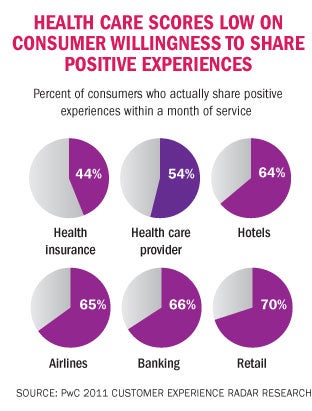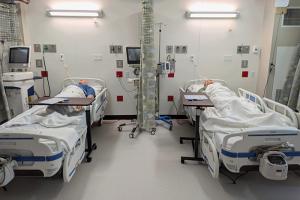Winning customer approval tougher for hospitals
 Hospitals must focus greater attention on patient satisfaction to help earn higher incentive payments from the Centers for Medicare & Medicaid Services under value-based purchasing. But unlike other consumer-centric industries like hotels, airlines, banking and retail, health care faces a tougher challenge.
Hospitals must focus greater attention on patient satisfaction to help earn higher incentive payments from the Centers for Medicare & Medicaid Services under value-based purchasing. But unlike other consumer-centric industries like hotels, airlines, banking and retail, health care faces a tougher challenge.
A study released by PricewaterhouseCoopers' Health Research Institute in July found that the health care sector scored significantly lower on patients' willingness to report positive interactions. Survey data showed that only 54 percent of consumers share good experiences about health care providers. That's sharply lower than was found for retail (70 percent), banking (66 percent), airlines (65 percent) or hotels (64 percent).
In some instances, patients are also less forgiving than a disappointed retail customer.
"As patients behave more like 'consumers,' health care needs to deliver a higher level of personalized service, satisfaction and overall experience — or risk losing business to the competition," the report notes.
The study points out that service industries work to create "positive moments of truth for their customers — critical points where consumers form an impression or make up their minds about future purchases."
Interestingly, 70 percent of the respondents attributed positive moments of truth with health care providers to friendly staff.
To win patients over more consistently, hospitals may need to invest more in understanding customers and their preferences to create such moments. In addition, the report suggests that hospitals give staff the authority and skills to change the customer experience. This may require greater investment in hands-on customer service training for all patient-facing staff, including environmental services associates. The report identified the University of Toledo Medical Center and Ronald Reagan UCLA Medical Center as organizations that use patient-centered training and experience enhancement tools.




